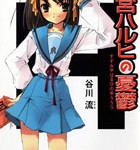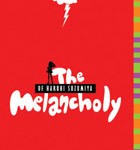The Melancholy of Haruhi Suzumiya [Light Novel]
| Japanese Title: Suzumiya Haruhi no Yuutsu | ||
| Genre: Comedy/Romance/Science Fiction | ||
| Length: 1 Novel | ||
| Allegiance: Kadokawa Shoten/Little, Brown Books | ||
| Writer: Nagaru Tanigawa | ||
| Vintage: 2003 | ||
| Intelligence Agency Report by: Tricky | ||
| Before it was an anime or manga, the story of Haruhi Suzumiya was originally a series of light novels (aka: books with pictures) released in Japan. It is the tale of an energetic-but-jerkish high school girl, Haruhi Suzumiya, and her exploits with the school club she forms with her classmates Kyon (the cynical narrator), Yuki (an emotionless book-lover), Mikuru (a shy upperclassman), and Itsuki (an overly-friendly exchange student) to search for the mysterious and supernatural. And then a twist is revealed that changes the genre of the whole thing altogether. | ||
|
|
||
| Research Agent Report by: Tricky | ||
| Plot Characters Impact |
8.75 9.25 9.00 |
|
| Overall | 9.00 | |
| (not an average) | ||
| Any discussion of Haruhi must include the spoiler that is central to the work. The problem is that while one does not wish to divulge plot twists unnecessarily, the main thing that attracts people to the series is inherent within such details. We may not learn until chapter five that Harry Potter is going to a wizard school, or until episode six that Angel is a vampire, but what was once a twist is now a selling point. With this in mind, in the unlikely event that you have avoided someone spoiling the twist of the Haruhi series, I would recommend going ahead and reading the book and not the following paragraphs. Most fans of anime tropes will find it enjoyable, and it is better to be surprised than not.
That said, it is likely that most of the people who have heard of Haruhi do so from the anime series which managed to cross the ocean before the book did. It is the story of Kyon, an average, if incredibly sarcastic young man at an average Japanese high school who encounters Haruhi Suzumiya, a girl who introduces herself to the class by proclaiming her boredom with everything and everyone in the world. Soon she starts a club devoted to the discovery of the supernatural. She ropes Kyon into the club, along with Mikuru (a sweet, easily-embarrassed upperclassman chosen by Haruhi because she thinks that a moe type student with large breasts will draw people to the club), Itsuki (a transfer student, because, according to Haruhi, transfer students always have a mysterious secret), and Yuki (a bespectacled emotionless girl that happened to be in the room that Haruhi commandeered). Haruhi forces them to go on various adventures in pursuance of aliens, time travelers and ESPers. So far, so good. Soon, though, it is revealed to both Kyon and the reader that unbeknownst to Haruhi, Mikuru is, in fact, a time traveler; Itsuki is, in fact, an ESPer; and Yuki is, in fact, an alien. What’s more, they all have Haruhi as the object of their study because she has a secret that affects the very existence of the universe. Now, works in which an average high school guy comes in contact with a magic-type potential girlfriend are a dime a dozen, but here, expectations are subverted in several ways: 1. the very immensity of her power. Haruhi is capable of literally remaking the universe with a thought, and 2. She is a complete asshole . She’s abrasive, cruel, manipulative, tactless, and has no time anyone who doesn’t interest her. If she ever finds out about her power, or gets angry or bored enough to do it inadvertently, she will destroy the whole of creation and everyone in it to remodel it to one she prefers. There is no great evil for her to fight except herself. And now, Kyon has to deal with the fact that Haruhi is interested in him… and what’s more, the fact that there are aliens, ESPers and time travelers interested too. As I mentioned before, the first contact the western world had with the story was in the form of the anime, which is kind of a shame. The interpretations in both mediums are of comparable quality, but the humor of the story comes out much better in prose: when written out, a scene in which Haruhi forces Mikuru to wear various sexy outfits against her will is a hilariously scathing parody of the concept of fan service. An animated version of the scene is just… well, fan service. And while Kyon gives hilariously sarcastic narration in both mediums, it’s more constant in the book and it’s really for the best. I love how he truly seems to resent that narrative logic would suggest he should fall in love with Haruhi. Most importantly though, the story is just better explained on the page than on the screen: the author includes tons of complicated scientific explanations and back-story which, although more legit in content than “reversing the polarity of the neutron flows” are monotonous when spoken out loud in full, or confusing when they are compressed for time. (As a side note, it doesn’t help matters that the anime production team has a habit for what can only be described as trolling: things like presenting episodes in an order that ensure it will make no sense to people to haven’t read the book and confusing even to those who have, starting a second season in the middle of a re-run of episodes without telling anyone, animating eight episodes that are 99.9% same in content… things like that.) On the one hand, I liked this book – it’s very funny, very interesting, and is well worth the read . On the other, I can’t help but be a little uneasy with the premise in a feminist theory sort of way: I may be reading too much into it, but I cringe a bit at the premise of a female granted the power to remake the world while everyone else around her desperately tries to maintain the status quo, and are depicted as right to be doing so. It may be an inversion of the usual magical girlfriend plot where said powerful female ultimately ends up using her power to land a husband, but it still seems to reveal a bit too much about Japanese gender politics for my liking. As I said, though, I read into things too much. Anyways, consider this a high recommendation for the volume. It is rated 15+, mainly for fantasy violence and some frank, if realistic, conversations about sex… you know, the type held everyday in every high school lunch room in the world, but not in most works actually set in high school. Don’t let the more disconcertingly hyping members of its fan base put you off: this story is well worth your time.
|
||


